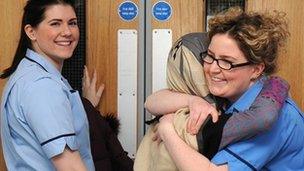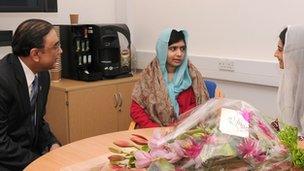Malala Yousafzai leaves Queen Elizabeth Hospital
- Published
Malala Yousafzai leaves the Queen Elizabeth Hospital in Birmingham
The Pakistani schoolgirl activist shot in the head by the Taliban has been discharged from a Birmingham hospital as an inpatient.
Malala Yousafzai, 15, was being treated at Queen Elizabeth Hospital (QEHB) after being transferred following the attack in October.
She will continue rehabilitation at her family's temporary West Midlands home.
The Taliban said it shot Malala, a campaigner for girls' education, for "promoting secularism".
The shooting, in a school bus, sparked domestic and international outrage.
'Strong young woman'
Malala was returning home from school in the north-western Swat district on 9 October when gunmen stopped her vehicle and shot her in the head and the chest.
She received immediate treatment in Pakistan where surgeons removed a bullet which entered just above her left eye and ran along her jaw, grazing her brain.
The teenager was then flown to the UK and was admitted to the QEHB on 15 October to receive specialist treatment.
Over the past few weeks, Malala has been leaving the hospital on home visits to spend time with her father Ziauddin, mother Toorpekai and younger brothers, Khushal and Atul.
The University Hospitals Birmingham NHS Foundation Trust said doctors believe she will continue to make good progress outside the hospital.

Malala Yousafzai embraced a nurse at Queen Elizabeth Hospital
The schoolgirl is due to undergo cranial reconstruction surgery in late January or early February.
Dr Dave Rosser, the trust's medical director, said: "Malala is a strong young woman and has worked hard with the people caring for her to make excellent progress in her recovery.
"Following discussions with Malala and her medical team, we decided that she would benefit from being at home with her parents and two brothers.
"She will return to the hospital as an outpatient and our therapies team will continue to work with her at home to supervise her care."
Peace award
Since the shooting, Malala and her father have had threats made against their lives by the Taliban.
Foreign Secretary William Hague tweeted: "Delighted #Malala is well enough to leave hospital.
"The future Pakistan she dreams of is one we must support."
Malala came to prominence when, as an 11-year-old, she wrote a diary for BBC Urdu, external, giving an account of how her school in Mingora town dealt with the Taliban's 2009 edict to close girls' schools.
Her love for education, and her courage in standing up to the Taliban, made her an icon of bravery and earned her a national peace award in 2011.
The president of Pakistan, Asif Ali Zardari, visited Malala at the hospital on 8 December and assured the family his government would meet the expenses of the treatment.

President Asif Ali Zardari described Malala as a "remarkable girl" during a visit last month
On Wednesday, the Pakistan government announced that Malala's father had been given a job in Birmingham.
Mr Yousafzai has been appointed education attache at the Consulate of Pakistan for at least three years.
The family has received thousands of cards, gifts and messages of support from well-wishers since arriving in the UK.
In a statement in November, her father said the family "deeply feel the heart-touching good wishes of the people across the world of all castes, colour and creed".
He added: "I am awfully thankful to all the peace-loving well-wishers who strongly condemn the assassination attempt on Malala, who pray for her health, and support the grand cause of peace, education, freedom of thought and freedom of expression."
Tens of thousands of people have also signed a petition calling for Malala to receive the Nobel Peace Prize.
West Midlands Police said it continued to work with the hospital and the family "to provide support and liaison as Malala recuperates from her injuries".
The force said it would be inappropriate to comment on the ongoing policing operation.
- Published2 January 2013
- Published18 December 2012
- Published26 October 2012
- Published12 October 2012
- Published10 October 2012
- Published10 October 2012